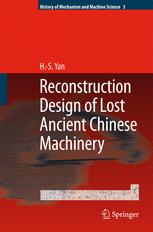

Most ebook files are in PDF format, so you can easily read them using various software such as Foxit Reader or directly on the Google Chrome browser.
Some ebook files are released by publishers in other formats such as .awz, .mobi, .epub, .fb2, etc. You may need to install specific software to read these formats on mobile/PC, such as Calibre.
Please read the tutorial at this link: https://ebookbell.com/faq
We offer FREE conversion to the popular formats you request; however, this may take some time. Therefore, right after payment, please email us, and we will try to provide the service as quickly as possible.
For some exceptional file formats or broken links (if any), please refrain from opening any disputes. Instead, email us first, and we will try to assist within a maximum of 6 hours.
EbookBell Team

4.0
46 reviewsAncient China was outstanding in mechanical technology before the 15th century. Numerous ingenious machines were invented. However, due to incomplete documentation and loss of finished objects, most of the original machines cannot be verified and many of the inventions did not pass down to later generations. This book, based on the author’s research and teaching experiences over the last 20 years, is devoted to presenting an innovative methodology in the area of mechanical historiography for the systematic reconstruction design of ancient Chinese machines that have been lost to time. Its purpose is to generate all possible design concepts of lost machines. If the defined and/or concluded design specifications, topological characteristics, and - sign requirements and constraints are feasible, one of the resulting rec- struction designs should be the original design. Such an approach provides a logical tool for historians in ancient mechanical engineering and techn- ogy to further identify the possible original designs according to proven historical archives. However, this work will not deal with the credibility of historical literary works. It supposes that the lost machines existed, and tries to demonstrate the feasibility of reconstructing the lost designs. The book is organized in such a way that it can be used for teaching, research or self-study. Chapter 1 introduces the study, classifications, and process for the reconstruction design of ancient machinery.